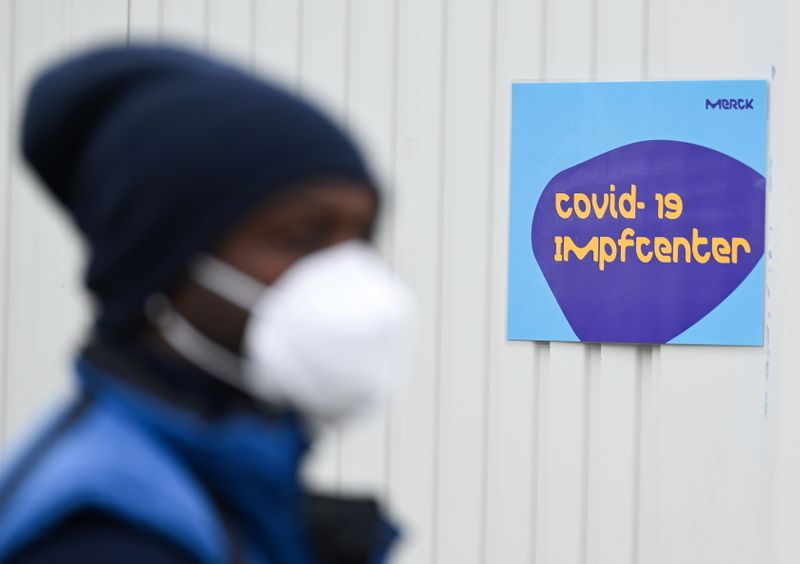By Ludwig Burger and Patricia Weiss
FRANKFURT (Reuters) -European companies playing key supporting roles in COVID-19 vaccine manufacturing are working to move production and supply chains closer to their customers to guard against trade restrictions that have interrupted supplies during the pandemic.
Germany's Merck KGaA, whose Life Science unit is one of the world's largest makers of bioreactor gear and supplies, told Reuters it is pushing to spread its production network geographically so that fewer shipments have to cross customs borders.
U.S. regulations in particular, which give priority to companies fulfilling U.S. government contracts, have posed a challenge for Merck as its seeks to meet soaring demand for supplies such as sterile fermentation bags and filters.
But the United States is not the only country engaging in what some call vaccine nationalism. India barred vaccine exports in mid-April to focus on its domestic immunisation drive as infections exploded across the country, upsetting the inoculation plans of many African and South Asian countries.
In the wake of production shortfalls at AstraZeneca (NASDAQ:AZN) earlier this year, the European Union imposed an export-monitoring scheme and accused Britain of withholding COVID-19 vaccine volumes that it said should be shared with the EU.
"Every forward-looking decision we have made integrated the geographical dimension into it," Chief Executive Belen Garijo told Reuters. "In the context of the trade constraints that we have seen, we have enhanced our global diversification any time we had the chance," she added.
At Rentschler Biopharma SE, a German contract manufacturer for major pharma companies that is helping to produce CureVac's COVID-19 vaccine candidate, the pandemic triggered a review of its procurement routes.
"The coronavirus crisis gave us an important push to bring our supply chains closer to home. We decided to source most of our equipment in Europe so that we are no longer as dependent on the United States," said Chief Executive Frank Mathias, naming sterile bags for bioreactors as an example. He would not name suppliers.
Mathias said supply chains collapsed earlier this year when the United States commandeered certain volumes for domestic vaccine producers.
The U.S. Defense Production Act with its system of rated orders that prioritise U.S. crisis response, also hobbled Merck's ability to serve vaccine makers elsewhere in the world.
In response, Merck in March laid out plans to invest 25 million euros in France to make disposable plastic materials for bioreactors, an essential input for COVID-19 vaccine manufacturing.
The new site, Merck's first such facility in Europe, will likely come on stream at the end of 2021, adding to similar production lines in runs in the U.S. and China.
That followed it investing $47 million in its U.S. facilities in Massachusetts and New Hampshire in December, at the time touted as strengthening its global output to meet unprecedented demand.
"The pandemic has been a wakeup call," said Merck's Garijo. "You want to have a global footprint in order to be able to deal with potential trade constraints."
Family-controlled Merck also makes prescription drugs and chemicals for semiconductor production, but its Life Science unit, mostly made up of businesses formerly known as Millipore and Sigma Aldrich, has become its main earnings driver.
Its competitors include Thermo Fisher, Danaher (NYSE:DHR) and Sartorius.
In another move to avoid long transport routes and any fallout from international wrangling, German family-owned vaccine maker IDT Biologika earlier this year laid out plans to invest more than 100 million euros to produce AstraZeneca's COVID-19 vaccine in collaboration with the Anglo-Swedish drugmaker.
The production line, currently set to come on stream in 2023, would be designed to churn out Astra's shots or other vaccines of the same viral vector class, to the tune of at least 360 million doses a year.
IDT would make the active ingredient and mix, bottle and pack the final product, combining in one place a suite of production steps that are currently widely scattered.
IDT said the project was on track but declined to comment further. The company has said Germany's federal health ministry had assisted in the project but the investment was not subsidized.

Retooling production networks in a pharma sector that has for decades relied on cross-border exchange and international division of labour can only be done in incremental steps, cautioned Merck CEO Garijo.
"You cannot move a factory from one day to the other, this takes time," she said.